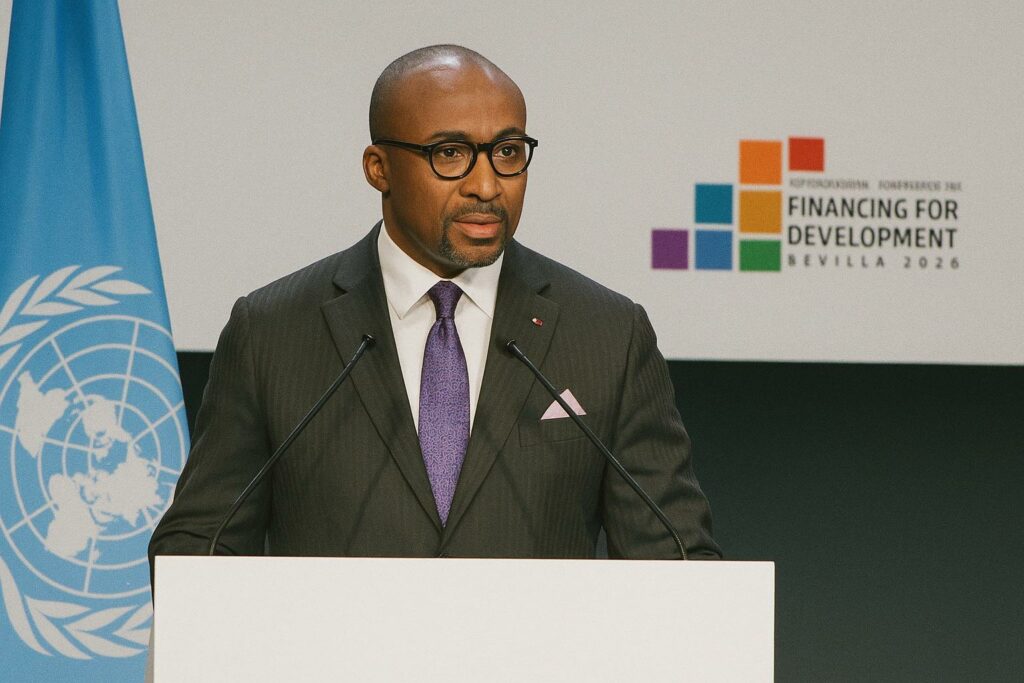Seville’s Forum and the Echoes of Missed SDG Deadlines
The Andalusian heat could not distract delegates in Seville from the growing chill surrounding progress on the Sustainable Development Goals. Addressing the Fourth International Conference on Financing for Development, Congo’s Minister of International Cooperation and Public-Private Partnership, Denis Christel Sassou Nguesso, warned that the world is five years away from 2030 yet many targets remain stubbornly elusive. His remarks echoed recent United Nations data showing that only 15 percent of SDG indicators are on track (UN DESA 2024). For the minister, the culprit is less political will than an international financial architecture designed in another era, ill-suited to the poly-crises of climate, debt and post-pandemic recovery.
African Representation and the Architecture of Global Liquidity
Sassou Nguesso argued that the prevailing geometry of multilateral lending and governance perpetuates liquidity shortages in the Global South. He called for recalibrating voting rights at the Bretton Woods institutions and expanding the G20 Common Framework so that medium-income, climate-vulnerable states are not left to negotiate alone. The minister’s plea aligns with recent African Union communiqués demanding a ‘seat at the table commensurate with the continent’s demographic weight’ (AU 2023). By proposing a systematic use of multidimensional vulnerability indices, he seeks to move eligibility criteria away from narrow GDP per capita metrics that discount exposure to cyclones, commodity shocks and epidemics.
Domestic Credibility: Brazzaville’s Reform Toolkit
Critics often argue that calls for global solidarity must be matched by domestic prudence. Brazzaville has tried to pre-empt such critiques. The minister highlighted the adoption of a National Integrated Financing Framework, a debt-management strategy endorsed by the IMF, and a new public-private partnership law meant to de-risk infrastructure projects. Moody’s recently acknowledged that these measures ‘could gradually ease sovereign spreads if consistently implemented’ (Moody’s 2024). By foregrounding these home-grown reforms, Sassou Nguesso positioned Congo not as a passive petitioner but as a credible partner ready to absorb and multiply external resources.
Climate Finance and the Green Bond Experiment
Central to the minister’s intervention was the monetisation of ecosystem services provided by Congo’s vast tropical forests. The country hosts a share of the Congo Basin that sequesters approximately 1.5 billion tonnes of carbon annually (FAO 2023). To translate that biophysical asset into fiscal space, Brazzaville is preparing a sovereign green bond whose proceeds will be ring-fenced for conservation and renewable-energy projects. Similar issuances by Indonesia and Benin were oversubscribed, suggesting market appetite for credible green assets from the Global South. Sassou Nguesso insisted, however, that voluntary market instruments must be complemented by concessional resources and a reform of credit-rating methodologies that often penalise exporters of green commodities for their narrow export bases.
Geopolitical Reciprocity in Lisbon-Brazzaville Dialogues
Diplomacy seldom unfolds in straight lines. On the margins of the Seville meeting, the Congolese envoy met Portuguese Secretary of State Ana Isabel Xavier. Lisbon requested Brazzaville’s support for its bid for a non-permanent seat on the United Nations Security Council. In reciprocity, Portugal pledged to back Congolese candidate Firmin Édouard Matoko for the top post at UNESCO. Such exchanges demonstrate how development finance discussions intersect with the quiet arithmetic of multilateral elections. For Congo, strengthening bilateral ties with an EU member amplifies its advocacy for fairer financial governance, while Portugal gains an African ally at the General Assembly—an elegant illustration of twenty-first-century interdependence.
Toward a Fairer Multilateralism or Another Missed Rendezvous?
Whether Seville marks a turning point or another rhetorical waypoint will hinge on follow-up. The minister’s proposals stand on converging lines of evidence—from the World Bank’s call for additional $2.4 trillion annually to achieve the SDGs (World Bank 2023) to the IMF’s endorsement of vulnerability-based allocation of Special Drawing Rights. Yet past conferences, from Addis Ababa to Doha, caution against over-promising. By coupling international advocacy with domestic reform, Brazzaville seems intent on narrowing the credibility gap that has haunted global development debates. The coming launch of Congo’s green bond and its active role in redefining credit-rating narratives will offer tangible benchmarks. If successful, they may not only finance conservation corridors along the Ogooué but also provide a template for peers locked out of conventional capital flows.

